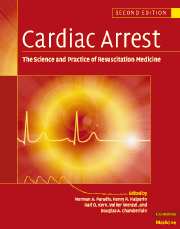Book contents
- Frontmatter
- Contents
- List of contributors
- Foreword
- Preface
- Part I Introduction
- Part II Basic science
- Part III The pathophysiology of global ischemia and reperfusion
- Part IV Therapy of sudden death
- Part V Postresuscitation disease and its care
- 47 Postresuscitation syndrome
- 48 Prevention and therapy of postresuscitation myocardial dysfunction
- 49 Prevention of postresuscitation neurologic dysfunction and injury by the use of therapeutic mild hypothermia
- 50 Postresuscitation neurologic prognostication and declaration of brain death
- 51 Bringing it all together: brain-oriented postresuscitation critical care
- Part VI Special resuscitation circumstances
- Part VII Special issues in resuscitation
- Index
50 - Postresuscitation neurologic prognostication and declaration of brain death
from Part V - Postresuscitation disease and its care
Published online by Cambridge University Press: 06 January 2010
- Frontmatter
- Contents
- List of contributors
- Foreword
- Preface
- Part I Introduction
- Part II Basic science
- Part III The pathophysiology of global ischemia and reperfusion
- Part IV Therapy of sudden death
- Part V Postresuscitation disease and its care
- 47 Postresuscitation syndrome
- 48 Prevention and therapy of postresuscitation myocardial dysfunction
- 49 Prevention of postresuscitation neurologic dysfunction and injury by the use of therapeutic mild hypothermia
- 50 Postresuscitation neurologic prognostication and declaration of brain death
- 51 Bringing it all together: brain-oriented postresuscitation critical care
- Part VI Special resuscitation circumstances
- Part VII Special issues in resuscitation
- Index
Summary
Introduction
The ability to prognosticate or predict accurately the eventual neurologic outcome following successful restoration of native cardiac function has profound clinical, ethical, and financial consequences. Although this chapter focuses on the overall prognosis of the patient who has successfully returned to spontaneous circulation after cardiac arrest, most of the recommendations based on existing data focus on poor or unfavorable outcome. Salient points of recent important studies, focused review, meta-analyses of the existing literature on this topic are included. This chapter provides a sequential approach to evaluating the neurologic status of patients resuscitated from cardiac arrest leading to the ability to predict early trends, especially during the first 72 hours postarrest. The key concepts and discussion of neurologic prognostication are based on intra-arrest factors, clinical examination, and laboratory tests such as electroencephalography (EEG), evoked potentials, analysis of cerebrospinal fluid (CSF) brain enzymes, and brain imaging. A detailed description of how to perform bedside neurologic examination and brain death clinical examinations is provided. A more comprehensive review on brain injury after cardiac arrest, including an expanded discussion of prognostication was recently published.
Consideration in prognostication of neurologic outcomes
Study design
Since the last edition of this book, several new studies, structured reviews, and rigorous meta-analyses have been undertaken specifically to clarify prognostication of neurologic outcome after cardiac arrest. We focus on the quality of study design of data collection, length of followup, methods of analysis, and an understanding of the power of the statistical analysis.
- Type
- Chapter
- Information
- Cardiac ArrestThe Science and Practice of Resuscitation Medicine, pp. 885 - 901Publisher: Cambridge University PressPrint publication year: 2007



